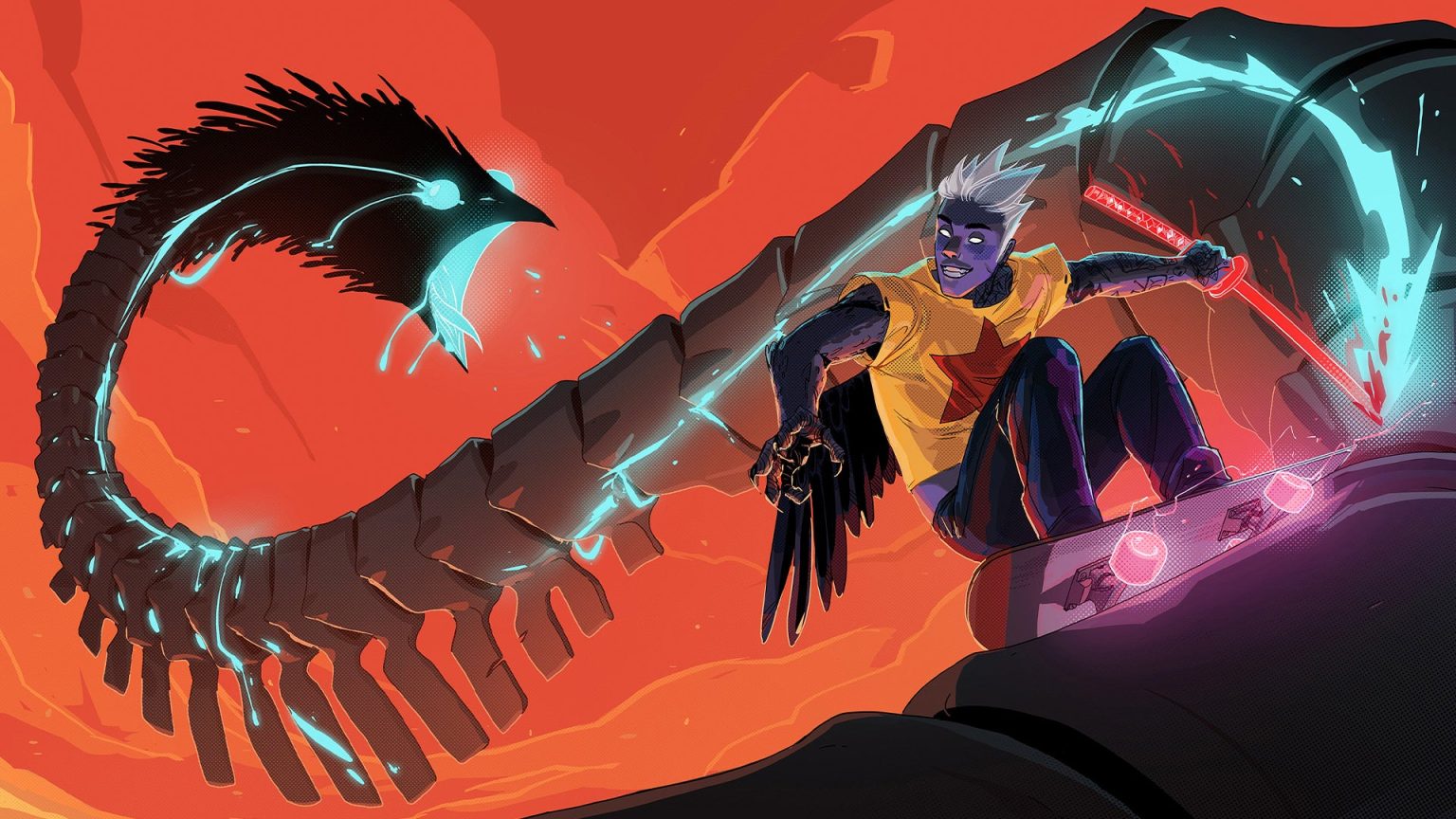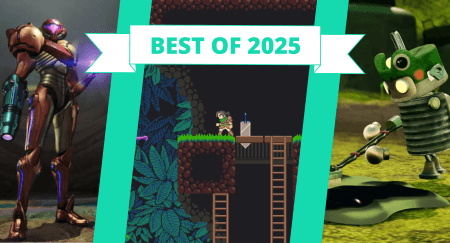“So here I am, doing everything I can / Holding on to what I am, pretending I’m a superman”
Did those lyrics stir something in you? If, like me, you spent your childhood playing the Tony Hawk’s Pro Skater (THPS) series of games, it’s impossible not to start grooving along to Goldfinger’s ska beats in your head. In many ways, growing up in the late 90s and early 00s meant growing up amidst the golden age of skateboarding games. The THPS series was era-defining, and the follow-up Tony Hawk’s Underground series formed an incredible coda to the period with its Jackass-inspired antics.
During the 2010s, we went through something of a comparative skateboarding drought, but this seems to be easing recently, with titles like Session and Skater XL providing balm to our dry and cracked trick fingers.
When Helskate first came to my attention at the Steam Next Fest in February, I was very excited. Here was a skating game that promised to be more than just a skating game. It’d be a roguelite, too, blending THPS with Hades. A game that pulled this off was bound to be a smash hit, effortlessly marrying skating and exciting combat, combined with a playful tone.

Sadly, Helskate doesn’t achieve this lofty goal. At least, not yet. Playing games in early access is always something of a risky proposition since there’s a high degree of likelihood that the final game will look and feel considerably different. I hope that this is the case with Helskate.
Stygian Skateboarder
The rough gist of the story of Helskate is this: you are Anton Falcon, a luckless one-winged demon (it’s not clear?). With a name that’s uncannily similar to another skating Birdman, Anton is trying to escape from Vertheim (a sort of underworld) and reach a longed-for beach. Along the way, you do tricks, collect upgrades for your powers, and fight Vertheim’s more overtly evil denizens, as well as skating in competitions overseen by King Garland, who’s not Anton’s biggest fan, to put it mildly.
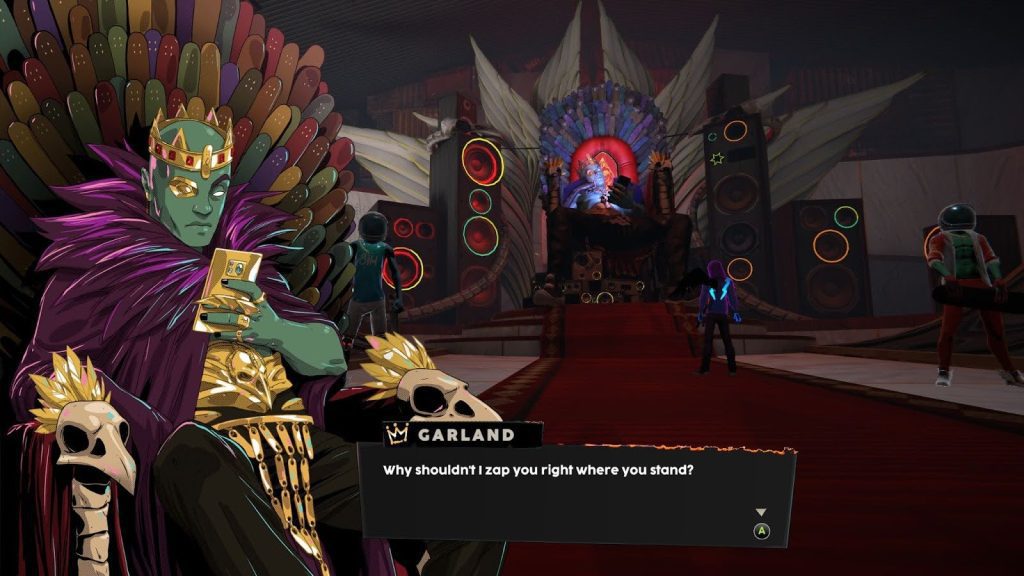
The story and dialogue are fine—they’re not going to set your world alight, and some of it comes across like it’s trying a little too hard to be cool. Ultimately, they’re not terrible, and serve their purposes for getting troublemaker Anton back onto the half-pipes.
Each time you die, you return to Mall Jail (the concept of which did get a laugh out of me), a perfect setting for Anton’s base, young mall trash that he is. Here, there are various shops that you can use to upgrade your abilities with currencies collected in Vertheim. These upgrades include tattoos (that don’t actually change Anton’s appearance, sadly) and new decks that change your equipped weapon. Upgrades complete, you head out into Vertheim yet again and repeat.
Back to the Old Nosegrind
The core gameplay loop of Helskate is made up of two components: skating and fighting. I think it’s important to look at the gameplay loop of this game in the manner of Hegelian dialectics: thesis, antithesis and, finally, the synthesis of both.

There’s no easy way to say this: the combat isn’t fun. Helskate doesn’t have any of the heft or spark of Hades’ combat. Hammering R1 to light attack will get you through the vast majority of encounters. The wind-up on heavy attacks feels far too long, interrupting the flow and drawing everything to a grinding halt.
Then there’s the dodge, which, while it can be effective, flings you just a little too far, interrupting your lines, and throwing off your skating lines. The utility of the dodge is lessened by the fact that, while you can see the enemy’s projectiles and where they’re aiming, some of them will move their aim as they attack, so try as you might to avoid their attacks, it’s far from predictable.
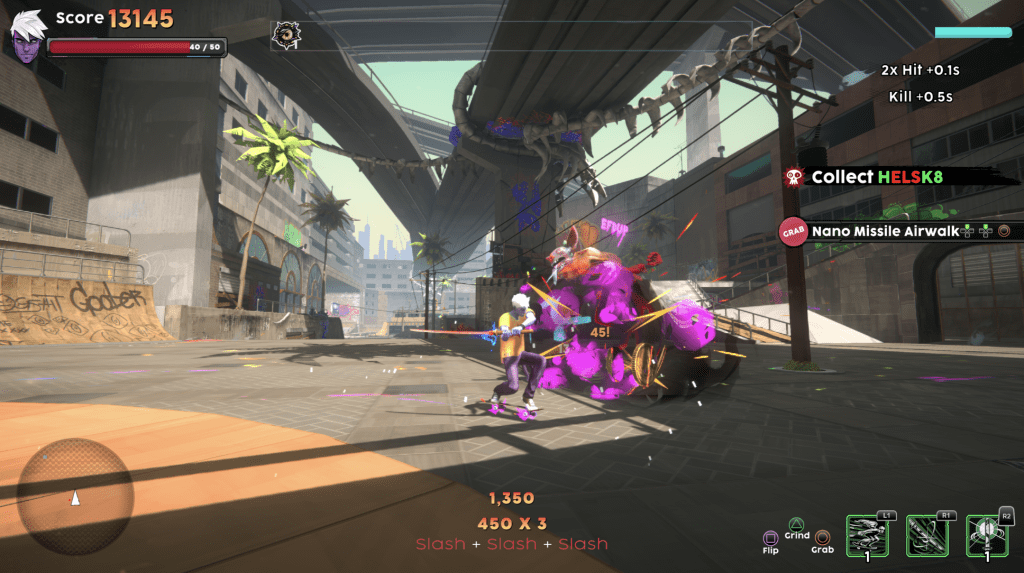
The skating, too, is not particularly good, which is a problem given that this is first and foremost a skating game. It’s the strongest part of the game in its current state, but it has too many technical and design faults for me to fall in love with it. There are some bad framerate stutters on my desktop (Intel i7-12700F, RTX 4070, 32GB RAM), which throws off the trick timing. Due to combat buttons sitting on your bumpers and triggers, the game has no revert nor spine transfers, which makes racking up mega combos incredibly tricky.
As such, when you land tricks from a ramp, you need to hammer out a manual quickly, and the timing window is super tight, far tighter than that of the equivalent window in Pro Skater. Despite the game handing you a combo shield at times, which allows you longer gaps in between tricks, it’s not enough. As racking up combos, complete with an enemy kill, is a regular challenge in Helskate, it turns what should be a joyous example of locking into a flow state into a frustrating challenge.
Skatefighter
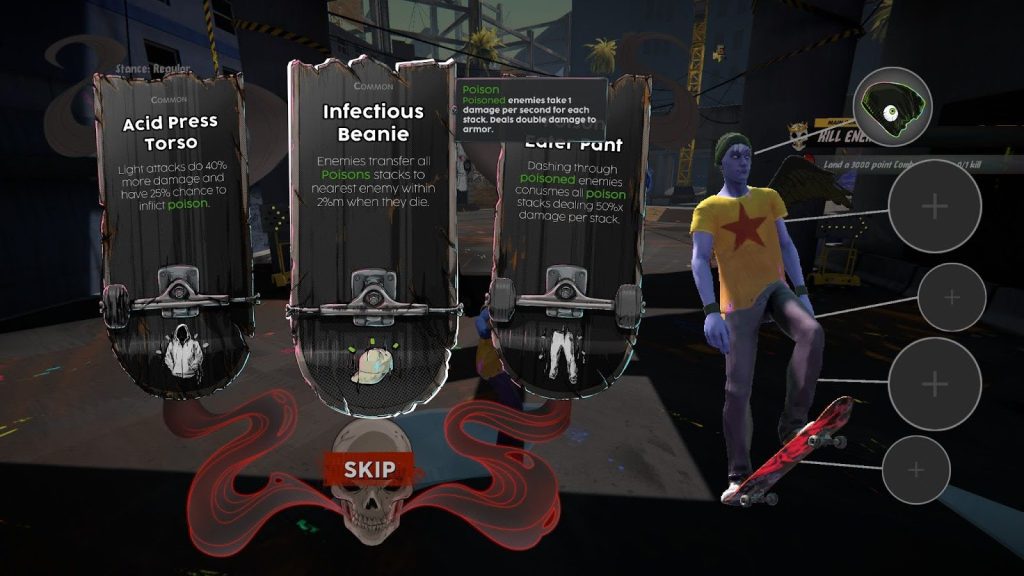
So, when you combine these two core gameplay elements, how does it feel? Sadly, it drags both of the systems down. The skating’s slightly erratic movement can make it hard to reach and attack enemies, while the necessity of combat means you can’t just get into a pleasant flow state and rack up huge scores like you can in THPS. If you thought, as I did, that getting off your board for the combat sequences may allow you to at least make it slightly more conventional and enjoyable, you’re out of luck: hitting an attack input will thrust you back onto your board, so there’s no frustration mitigation.
The level design is another bugbear and is often your worst enemy in the game’s battles. There are spikes and other hazards littered across many levels, and falling into any of these will reduce your health. Sure, that’s to be expected, but jumping and dodging ever-so-slightly too far and falling into apparently deadly water was a constant issue throughout my time with Helskate.
I’ve mentioned the framerate stutters being an issue, but that’s not the only annoyingly regular bug that’s present. Falling through scenery and, indeed, falling through the floor and out of the world happened multiple times during my time playing Helskate. In one instance that made me never want to play the game again, I glitched through some scenery that was above a spike trap, damaging me for no fault of my own.

Finally, the game’s visual style, despite having some degree of charm, can get very busy (and buggy) during combat. This means that you’ll be stuck flailing around like a fish someone pulled out of the water and stuck on a skateboard at times, to varying degrees of both success and annoyance.
The music is okay—it’s a bit more emo than I remember THPS being, which, combined with the aesthetic can make it feel a little like you’re starring in a commercial for Hot Topic. There are still some moments where the music and the action come together like in the Pro Skater games of yore, and it all feels right, but it doesn’t happen quite often enough.
Landing the Combo
So, is Helskate good in its present form? No, not really, and that upsets me. I was hoping that eventually, it would click with me and I’d get it, but that never happened. I desperately wanted this game to be good: I like both of its key influences a lot, but at the moment, it’s just not fun.

Helskate is the first game from Amsterdam-based developer Phantom Coast. I’ve wondered whether the game is simply trying to do the impossible (pun not intended). Can you blend the flow state gameplay of something like THPS with a roguelite, without diluting either experience? The project may be too ambitious—there are certainly roguelites that have made traversal interesting, like Rogue Legacy 2, but the added layer of complexity that comes with skating feels like it’s trying to do too much.
I hope that I’m wrong. Underneath all of the frustrations that I experienced with Helskate, there’s something here that is charming. I hope that over the course of its early access period, Helskate will eventually end up landing all its combos.
Score: N/A
Helskate is available now in Steam for PC and Mac on early access. It retails for $24.99.
Disclaimer: A review code was provided by the publisher. Given the game’s early state, we have elected not to provide a score.
Joe is a games critic and English literature graduate who knows far too much about video games and critical theory. He once wrote a Derridean reading of the animal masks in Hotline Miami. You can find him on Twitter @jchiverswriter.


